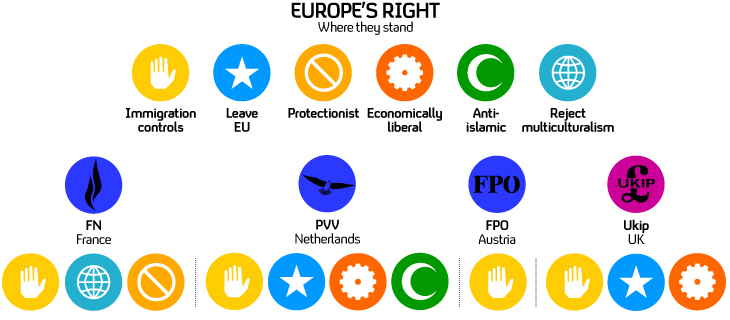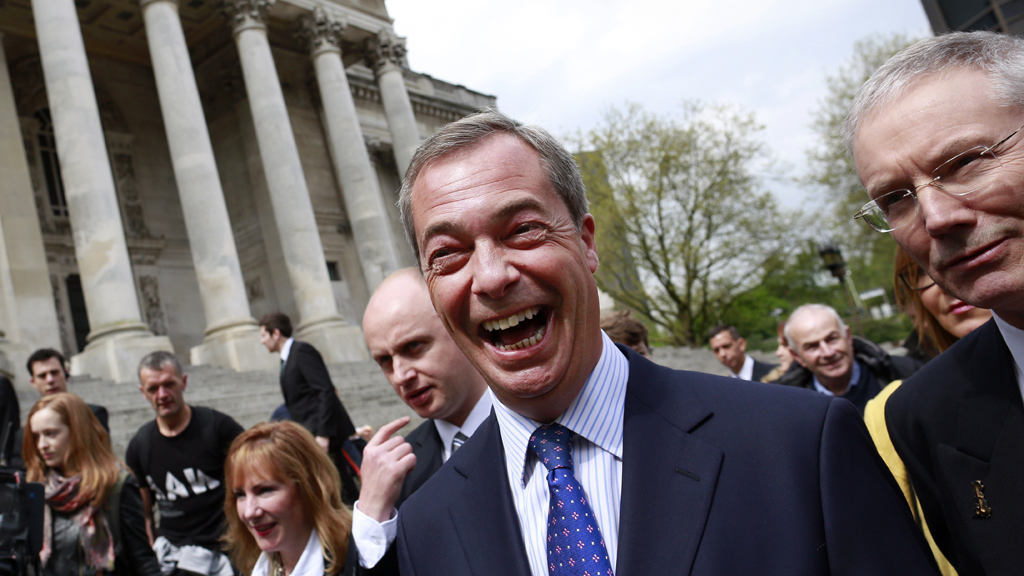New voice in Europe for EU’s right-wing parties
With the prospect of success in this week’s European elections, right-wing parties are creating a new, Eurosceptic bloc. Pauline Lockwood looks at the policies behind this new political grouping.

This week, voters across Europe will be going to the polls to elect their representatives in the European parliament, writes Channel 4 News producer Pauline Lockwood. After austerity, economic under-performance and dwindling living standards, Eurosceptic and far-right parties are expected to do well.
These parties come in all shapes and sizes: some cater for the populist right while others are openly xenophobic and racist. Yet some of the parties below are already planning to form a new Eurosceptic parliamentary bloc, the European Alliance for Freedom (EAF), set to replace the current, softer Europe of Freedom and Democracy (EFD).
As an official parliamentary grouping, members will have access to funds and a greater influence in policy making, which they hope will help them achieve their aim of reforming the European Union at least, or dismantling key European institutions at most.
France’s Front National and the Netherlands PVV are the driving force behind the new bloc, but other parties could help make or break this new alliance. Here is a break down of the main forces of the European far-right.
France: Front National
The Front National is expected to be one of the big winners of the European elections. It is predicted that it could win 18 seats – up from three in the current European parliament – and it has taken the lead in the several polls in France, with an average of 20 per cent of the national vote.
The Front National has been a growing political in the last 30 years, but witnessed a real boost from 2011 when Marine Le Pen took over from her controversial father Jean-Marie, who was prone to racist comments and kept the party on the margins of mainstream politics.
Marine’s recent efforts to detox the party have been successful. After years of stagnant economy, French voters no longer trust the political elite or any decisions from the European Union, and have been increasingly receptive the Front National straight-talking approach.
Netherlands: Dutch Freedom Party (PVV)
Banned in 2010 from entering the UK because of his anti-Islamic views, Geert Wilders has been successful in turning his party into a political movement, and is expected to pick up 17 per cent of Dutch votes.
The PVV did well in last national elections and will be the Front National’s key ally in the new EAF. Mr Wilders told Sky News that he was keen for Mr Farage to join the planned union with Marine Le Pen. His Eurosceptic policy focuses on retaking control of money and borders, but he wants to remain in the economic single market.
But Geert Wilders is best known for his anti-Islamic rhetoric, and caused several resignations from party members when he encouraged supporters to chant a slogan calling for a reduction in the number of Moroccans in the Netherlands. He has received death threats from Islamic groups.
Read Matt Frei: Brussels teeters as Europe's populists catch the mood of the day

United Kingdom: Ukip
The last week has been turbulent for Ukip, threatening its predicted success in the elections. Its young poster girl member resigned over concerns about the party’s attitude to race, and Ukip leader Nigel Farage has been criticised for describing Romanian immigrants as undesirable neighbours.
Yet Ukip is set for unprecedented success. The party has seen an upsurge in support amongst British voters in recent years. One poll, ComRes, this weekend put Ukip in first place ahead of the Conservatives and Labour with an estimated 35% of the vote.
Ukip is currently part of the EFD, but has so far refused advances from France’s Front National and the Netherlands’ PVV to join the planned new EAF bloc after the elections. Ukip’s policies differ from the Front National’s as it has a liberal approach to trade and economy, but it does share a desire to repatriate powers back to home governments.
Recently there was a public spat between Ms Le Pen and Mr Farage, when he rejected offers to join the bloc because he said her party was anti-Semitic. Le Pen hit back in an interview in the Times, saying that Mr Farage’s comments were defamatory and that he had only used them for political ends in the UK.
Former Ukip MEP Godfrey Bloom, forced to resign from Ukip over sexist comments, will be standing as an independent and has indicated that he would be joining the bloc if elected.
Austrian Freedom Party (FPO)
The Austrian Freedom Party has experienced something of a comeback after causing the collapse of Austria’s government coalition in 2002. It wants European reforms to limit its influence on Austria and, like most Eurosceptic parties, its main crux is anti-immigration rhetoric.
This has struck a chord with working-class voters, who are defecting from more traditional labour parties. Within Europe, it is the Front National’s most natural ally – they both have more socialist economic and social policies. The FPO currently polls above 25 per cent and is expected to win three or four seats.
The party, like most of its counterparts, is no stranger to controversy. Last month an FPO candidate, Andreas Moelzer, had to quit after he described Nazi Germany as being more liberal than the EU.
And the rest
Many other European countries have far-right parties who will be successful to varying degrees. Italy‘s Lega Nord is part of the current EFD, though it is expected to lose seats in this year’s election. Its representatives have been seen at EAF meetings.
Belgium’s Vlaams Belang, the Slovak National Party, Alternative for Germany, Swedish Democrats, the Finns Party and the Danish People’s Party are all expected to get seats and could be approached to join the EAF.
Though the main Eurosceptic parties could be described as far-right, Hungary’s Jobbik and Greece’s Golden Dawn can be qualified as extreme. Both are openly racist and xenophobic, with a history of violence against immigrant communities. They are both expected to gain between two and four seats but are considered as too extreme by the EAF to join their group.
Official parliamentary groups have to include at least 25 members from at least seven EU member countries, so whether the bloc successfully becomes a parliamentary group will depend on the ultimate outcome of the election, and the ability of the parties to work together. Despite their common ground of Euroscepticism, each party remains unique with sometimes vastly different policies beyond their discontent with the EU.
Generally, more moderate mainstream parties will remain in the main body of the European parliament, and though MEPs will be more squeezed by the fringes, the reality of the influence of far-right policies remains to be seen in the months and years to come.
Sources: Poll watch, Electionista Polling overview and MHP “The rise of eurosceptic parties and the 2014 European Parliament Elections”â??